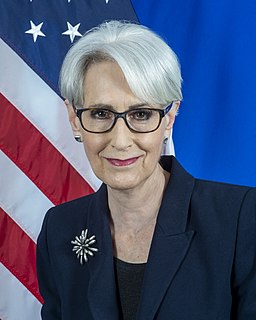A Quote by Fiona Hill
In the instance of Iran for Russia, Iran is a very important counterweight to the Sunni Muslim powers in the Gulf, but Russia's always been very concerned about potentially proselytizing and supporting groups inside of the Russian federation itself.
Related Quotes
Byrnes... was concerned about Russia's postwar behavior. Russian troops had moved into Hungary and Rumania, and Byrnes thought it would be very difficult to persuade Russia to withdraw her troops from these countries, that Russia might be more manageable if impressed by American military might, and that a demonstration of the bomb might impress Russia.
There has always been a confusion in the West about -Islam and about the Middle East and the assumption that the countries are Arab. Iranians very much object to that. They are very proud of their own history, but they have this real inferiority-superiority complex thing about the Arabs and the position of Islam in Iran. One of the reasons why Shi'a Islam is so entrenched in Iran is because it has allowed the Iranians to distinguish themselves from the Arabs, who are mostly Sunni.
The Saudis are so happy. People don't understand, the Saudi Arabian government - kingdom - hates Iran. They're scared to death of Iran. That's Shi'a versus Sunni Muslim, and the Iranians are Persians. They're not Arabs. So it's a double whammy. There is no love lost, and the Saudis have been petrified over Barack Obama's peace dance and nuclear dealings with the nation of Iran. They are ecstatic to have Donald Trump.
I fully share the Congress's objective of promoting nonproliferation and combating Iran's efforts to acquire weapons of mass destruction (WMD) and missile delivery systems. This issue remains at the top of the agenda with Russia as well as with other countries whose companies may be providing such assistance to Iran. In the case of Russian entities' cooperation with Iran, we have imposed penalties ten times in the past and stand ready to apply them again whenever necessary.
I think most of the Washington foreign policy establishment exists in a fantasy world when it comes to Syria. They fundamentally don't understand that Russia and Iran, from the beginning, had much more at stake in Syria than the United States did. Russia and Iran were going to do everything possible in order to keep Bashar al-Assad in power.
Specifically in reference to Iran, Donald Trump will not be able to renegotiate the nuclear arms pact. His attempt to do so will alienate all the European powers involved and will cost a number of US companies some very lucrative contracts. It is a losing proposition for him and for the US. Much more so than for Iran, who will turn more and more to Russia and China as trading partners.

































